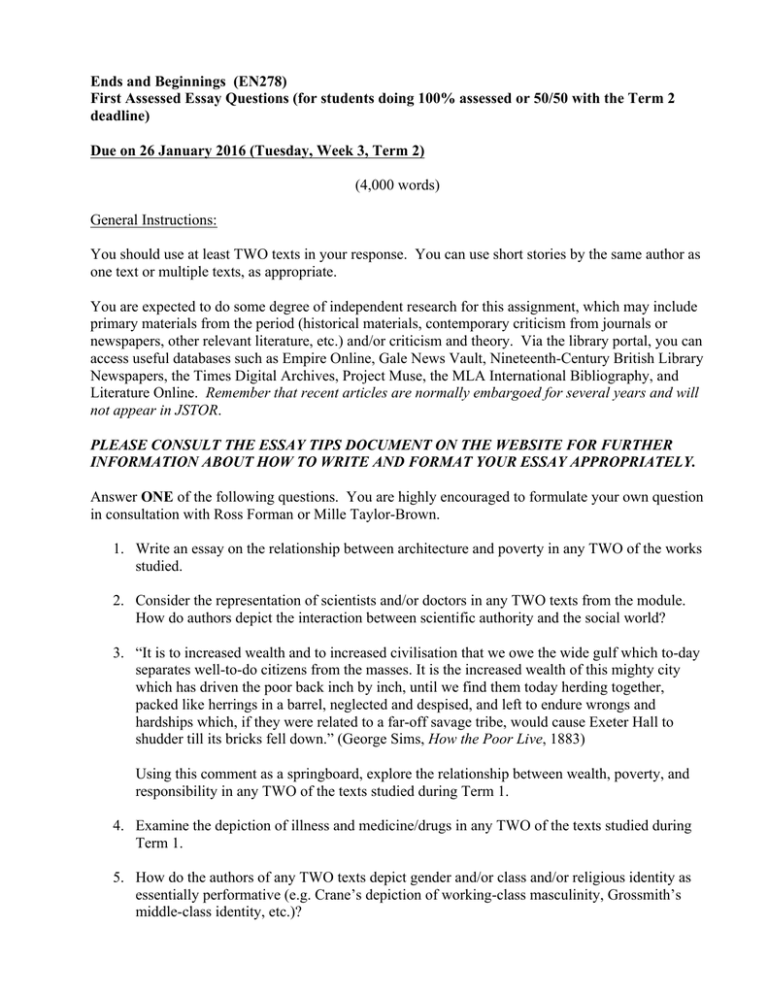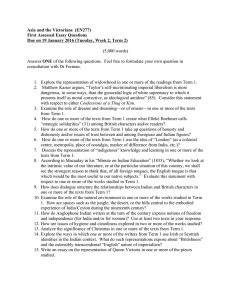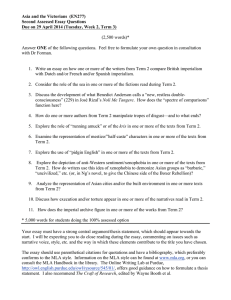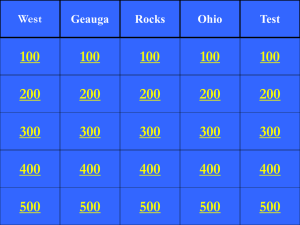Ends and Beginnings (EN278)
advertisement

Ends and Beginnings (EN278) First Assessed Essay Questions (for students doing 100% assessed or 50/50 with the Term 2 deadline) Due on 26 January 2016 (Tuesday, Week 3, Term 2) (4,000 words) General Instructions: You should use at least TWO texts in your response. You can use short stories by the same author as one text or multiple texts, as appropriate. You are expected to do some degree of independent research for this assignment, which may include primary materials from the period (historical materials, contemporary criticism from journals or newspapers, other relevant literature, etc.) and/or criticism and theory. Via the library portal, you can access useful databases such as Empire Online, Gale News Vault, Nineteenth-Century British Library Newspapers, the Times Digital Archives, Project Muse, the MLA International Bibliography, and Literature Online. Remember that recent articles are normally embargoed for several years and will not appear in JSTOR. PLEASE CONSULT THE ESSAY TIPS DOCUMENT ON THE WEBSITE FOR FURTHER INFORMATION ABOUT HOW TO WRITE AND FORMAT YOUR ESSAY APPROPRIATELY. Answer ONE of the following questions. You are highly encouraged to formulate your own question in consultation with Ross Forman or Mille Taylor-Brown. 1. Write an essay on the relationship between architecture and poverty in any TWO of the works studied. 2. Consider the representation of scientists and/or doctors in any TWO texts from the module. How do authors depict the interaction between scientific authority and the social world? 3. “It is to increased wealth and to increased civilisation that we owe the wide gulf which to-day separates well-to-do citizens from the masses. It is the increased wealth of this mighty city which has driven the poor back inch by inch, until we find them today herding together, packed like herrings in a barrel, neglected and despised, and left to endure wrongs and hardships which, if they were related to a far-off savage tribe, would cause Exeter Hall to shudder till its bricks fell down.” (George Sims, How the Poor Live, 1883) Using this comment as a springboard, explore the relationship between wealth, poverty, and responsibility in any TWO of the texts studied during Term 1. 4. Examine the depiction of illness and medicine/drugs in any TWO of the texts studied during Term 1. 5. How do the authors of any TWO texts depict gender and/or class and/or religious identity as essentially performative (e.g. Crane’s depiction of working-class masculinity, Grossmith’s middle-class identity, etc.)? 6. How does what William Booth calls “the African parallel” unfold in any TWO of the texts studied this term? 7. Explore the significance of theatricals or other forms of spectacle (such as the penny gaffe) in any TWO of the texts from Term 1. You may want to consider how and why the texts contain representations of other genres. 8. How do any TWO texts work with (or through) moments of paralysis? 9. According to Friedrich Engels, “Realism, to my mind, implies, besides truth of detail, the truthful reproduction of typical characters under typical circumstances.” How do any TWO of the works studied this term test this definition? How is the “typical” constituted? 10. How do language, imagery and narrative style help to create nuanced or “personal” city spaces in any TWO texts from Term 1? (Analyze, for example, the depiction of Pooter’s “London” versus Dicky Perrott's “London”). 11. Explore the depiction of “Jewishness” OR “blackness” OR “Chineseness” in TWO or more of the texts studied. 12. Consider the depiction of “streetwalking”—in relation to prostitution, crime, middle-class slumwork (e.g. the “slum lassies”), etc.—in any TWO of the works studied. 13. Explore the relationship between secrecy and knowledge in any TWO of the works studied in Term 1. 14. Consider the function of imperial paranoia about invasion and/or sexual predation in any TWO of the texts studied in Term 1. 15. Write an essay about scenes of physical fighting in any TWO of the texts studied in Term 1. What notions of the poor as savage, of masculinity and femininity, of Irishness or alterity, and of the struggle for existence are invoked by the authors in these scenes? 16. Explore how motifs of social/national and biological degeneration are linked together with reference to any TWO texts from Term 1. Your essay must have a strong central argument/thesis statement, which should appear towards the start. We will be expecting you to do close reading during the essay, commenting on issues such as narrative voice, style, etc. and the way in which these elements contribute to the title you have chosen. The essay should use parenthetical citations for quotations and have a bibliography, which preferably conforms to the MLA style. Information on the MLA style can be found at www.mla.org, or you can consult the MLA Handbook in the library. The Online Writing Lab at Purdue, http://owl.english.purdue.edu/owl/resource/545/01/, offers good guidance on how to formulate a thesis statement. I also recommend The Craft of Research, edited by Wayne Booth et al.







